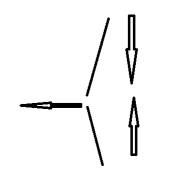RepRapFirmware 3.01-RC1 released
-
@dc42 sorry for my late reply
these are the results of my measurements
1000 ohm -> 160c
33o ohm -> 215c
220 ohm -> 237cwhich are roughly consistent with https://e3d-online.dozuki.com/Wiki/Thermistor_table. . so i feel, it's the thermistor which provides too low resistances. consequently there is no reason to blame duet.
thanks for your assistance.
-
Wouldn't it be time for RF3 to open a new Gcode site?
That would be much clearer.
I was just looking at the upcoming change of M581, and it's getting a bit confusing for me. -
A question of understanding
What is the expected behavior if this macro is called by trigger when printing / filament change; trigger6.g ; M400 abort "TEST abort" ; M400I just get a message otherwise no reaction
With this macro:; trigger6.g ; M400 abort "TEST abort"The print head stops and when pressed again (trigger) the printer status changes to idel.
Restarting the printout has no reaction, first requires an emergency stop to start a new print jobHas anyone already successfully used the
abortfunction?
For me, this doesn't work as expected at all.Board: Duet WiFi 1.02 or later
Firmware: RepRapFirmware for Duet 2 WiFi/Ethernet 3.01-RC1+1 (2020-02-09b1) -
@zerspaner_gerd said in RepRapFirmware 3.01-RC1 released:
The print head stops and when pressed again (trigger) the printer status changes to idel.
Restarting the printout has no reaction, first requires an emergency stop to start a new print job
Has anyone already successfully used the abort function?
For me, this doesn't work as expected at all.It's a bug in RC1, fixed in the forthcoming RC2.
-
@kir09Bes said in RepRapFirmware 3.01-RC1 released:
We've used the RepRapFirmware 3.01-RC1 on Duet 2 for Five Bar Parallel SCARA configuration. It produces some sort of jerking when passes through 0 of thetaR (see the picture in https://duet3d.dozuki.com/Guide/Five+Bar+Parallel+SCARA/24?lang=en). Could you suggest how to eliminate the jerking?
Nice to see more fellow 5bar'ers.
I did much of the later coding of the five bar scara and just now got to testing the RRF3 firmware. It was ported by the Duet guys from RRF2 to RRF3.
And as you say it has problems with thetaR < 0. In my testing it goes catastrophically wrong and sends the right arm way off.
I have to update my dev environment to RRF 3 and debug it...
-
@kir09Bes
... and after some building woes I got a firmware compiled. That made the board go black on the network. I have to remember how to hook up the serial port and dig deeper... -
@bondus
Nice to see that you have advanced in it. I hope you'll have fast results. -
@kir09Bes I found the problem after staring at the code for a few minutes. The firmware didn't treat the X and Y motor axises as rotating. When it tried to move from 1° to -1° (or 359°, same place) it tried to take the long unreachable way to get there.
I made a tiny pull request for the firmware to fix it. If you want a fixed binary firmware please contact me.
-
@kir09Bes, I also noticed the jerking issue you mention. It only occurs at certain places when doing fast moves. The stepper motors are stuttering.
It turns I was hitting the limit for step-rate. By changing microstepping from 256 to 128 it moves smooth again.
The 5-bar has to spin the arms pretty quickly at some positions to move the head at a decent speed. There probably is a way to limit the motor speed with a configuration.
-
@bondus looking the video, I think at this position the actuators need a lot of force *)because the angle at the hotend is very big, near the singularity. Precision in left-right-direction will be low also. High microstepping means low torque which may explain the 256-128 difference. If you move the hotend further away, it will be more precise imho.
I mean
 the forces need to be high for a movement from right to left.
the forces need to be high for a movement from right to left.